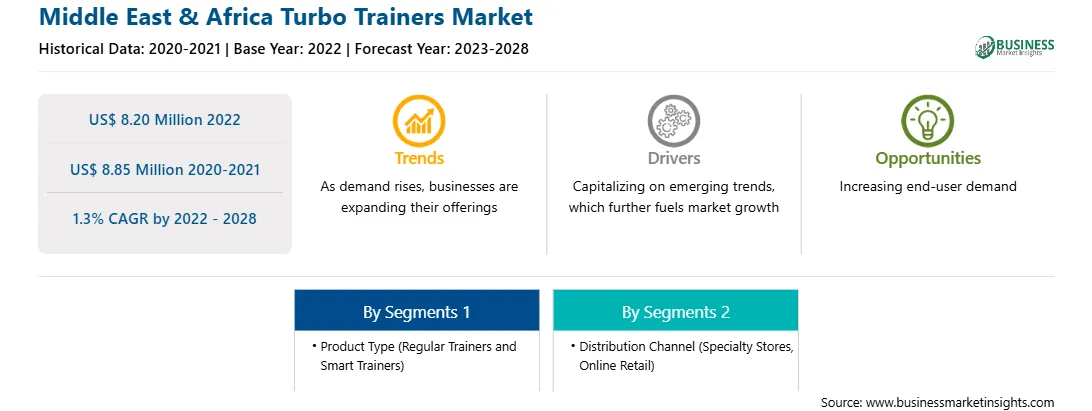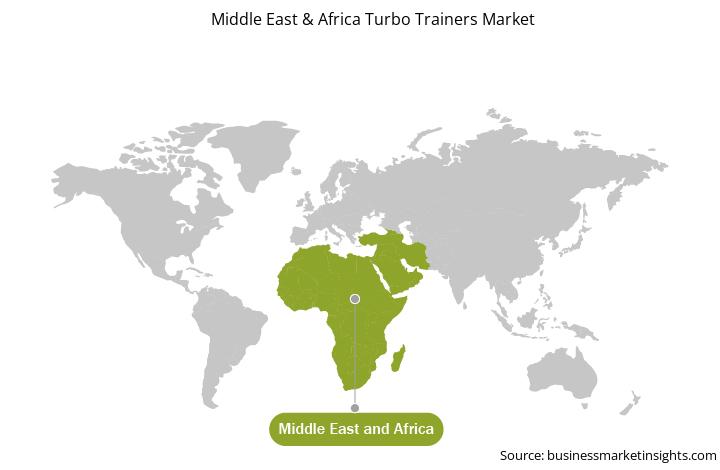The MEA turbo trainers market is expected to grow from US$ 8.20 million in 2022 to US$ 8.85 million by 2028. It is estimated to grow at a CAGR of 1.3% from 2022 to 2028.
Growing Popularity of Indoor Cycling
The rising incidence of cardiovascular diseases due to the lack of physical activity and changing lifestyles are encouraging people to opt for fitness activities. The COVID-19 pandemic further underlined the importance of health and fitness in the last two years. Sedentary work culture leads to many health ailments, and people are unable to join gyms and fitness clubs due to their busy schedules, which is driving the trend of home workouts such as indoor cycling. Regular cycling can increase cardiovascular fitness, enhance muscle strength and flexibility, improve joint mobility, decrease stress levels, correct posture, and coordination, strengthen bones, decrease body fat levels, prevent various diseases, and reduce anxiety and depression. Indoor cycling equipment may help users meet their daily physical activity requirements without stepping out of their homes. Turbo trainers can be used for indoor cycling; their features such as easy availability and cost-effectiveness, and the ability to put less strain on the spine and lower body make turbo trainers suitable equipment for indoor cycling. Thus, the growing popularity of indoor cycling is likely to provide notable growth opportunities for the turbo trainers market players in the coming years.
The market for turbo trainers is expected to grow at good pace across the MEA region in coming years. Turbo trainers are home fitness equipment that make cycling convenient indoors; it is extremely cost-effective. Moreover, the launch of fitness apps such as Zwift and Rouvy, which deliver a platform for consumers to interact, train, and compete virtually, is proliferating the demand for smart turbo trainers. Further, the rising health awareness among the consumers, the growing consumer spending power, a surge in urban population, and the development of technologically advanced turbo trainers are proliferating the market in the MEA. Moreover, the fitness sector has witnessed tremendous growth in the past few years. This factor has surged the demand for fitness equipment such as turbo trainers at home gyms and residential fitness stations. Furthermore, many women are actively participating in physical activities, boosting the gym culture across the nation. Hence, the rise in fitness culture is anticipated to propel the turbo trainers market during the forecast period. Obesity is a major health concern among the population of the MEA; as a result, the number of gyms has increased across the region, which ultimately boosted the demand for turbo trainers. Moreover, the growing online fitness training sessions have boosted the demand for home fitness equipment, which is bolstering the growth of the turbo trainers market across the region.
Strategic insights for the Middle East & Africa Turbo Trainers provides data-driven analysis of the industry landscape, including current trends, key players, and regional nuances. These insights offer actionable recommendations, enabling readers to differentiate themselves from competitors by identifying untapped segments or developing unique value propositions. Leveraging data analytics, these insights help industry players anticipate the market shifts, whether investors, manufacturers, or other stakeholders. A future-oriented perspective is essential, helping stakeholders anticipate market shifts and position themselves for long-term success in this dynamic region. Ultimately, effective strategic insights empower readers to make informed decisions that drive profitability and achieve their business objectives within the market. The geographic scope of the Middle East & Africa Turbo Trainers refers to the specific areas in which a business operates and competes. Understanding local distinctions, such as diverse consumer preferences (e.g., demand for specific plug types or battery backup durations), varying economic conditions, and regulatory environments, is crucial for tailoring strategies to specific markets. Businesses can expand their reach by identifying underserved areas or adapting their offerings to meet local demands. A clear market focus allows for more effective resource allocation, targeted marketing campaigns, and better positioning against local competitors, ultimately driving growth in those targeted areas.Middle East & Africa Turbo Trainers Strategic Insights

Middle East & Africa Turbo Trainers Report Scope
Report Attribute
Details
Market size in 2022
US$ 8.20 Million
Market Size by 2028
US$ 8.85 Million
Global CAGR (2022 - 2028)
1.3%
Historical Data
2020-2021
Forecast period
2023-2028
Segments Covered
By Product Type
By Distribution Channel
Regions and Countries Covered
Middle East and Africa
Market leaders and key company profiles
Middle East & Africa Turbo Trainers Regional Insights

MEA Turbo Trainers Market Segmentation
The MEA turbo trainers market is segmented based on product type, distribution channel, and country.
Based on product type, the MEA turbo trainers market is bifurcated into regular trainers and smart trainers. The smart trainers segment held a larger market share in 2022.
Based on distribution channel, the MEA turbo trainers market is segmented into specialty stores, online retail, and others. The specialty stores segment held the largest market share in 2022.
Based on country, the MEA turbo trainers market has been categorized into the UAE, Saudi Arabia, South Africa, and the Rest of MEA. Our regional analysis states that the Rest of MEA dominated the market share in 2022.
Elite; Garmin Ltd.; Jetblack Cycling; Kurt Manufacturing; Minoura Co. Ltd.; Nautilus, Inc.; Saris; Technogym SpA; Wahoo Fitness; and Wattbike Ltd. are the leading companies operating in the MEA turbo trainers market.
The Middle East & Africa Turbo Trainers Market is valued at US$ 8.20 Million in 2022, it is projected to reach US$ 8.85 Million by 2028.
As per our report Middle East & Africa Turbo Trainers Market, the market size is valued at US$ 8.20 Million in 2022, projecting it to reach US$ 8.85 Million by 2028. This translates to a CAGR of approximately 1.3% during the forecast period.
The Middle East & Africa Turbo Trainers Market report typically cover these key segments-
The historic period, base year, and forecast period can vary slightly depending on the specific market research report. However, for the Middle East & Africa Turbo Trainers Market report:
The Middle East & Africa Turbo Trainers Market is populated by several key players, each contributing to its growth and innovation. Some of the major players include:
The Middle East & Africa Turbo Trainers Market report is valuable for diverse stakeholders, including:
Essentially, anyone involved in or considering involvement in the Middle East & Africa Turbo Trainers Market value chain can benefit from the information contained in a comprehensive market report.